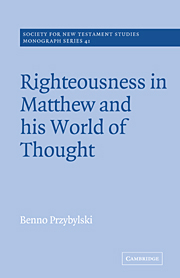Book contents
- Frontmatter
- Contents
- Preface
- Abbreviations
- 1 The problem of the meaning and significance of the Matthaean concept of righteousness
- 2 Tsedeq, tsedaqah and tsaddiq in the Dead Sea Scrolls
- 3 Tsedeq, tsedaqah and tsaddiq in the Tannaitic literature
- 4 The meaning of dikaiosynē, eleēmosynē and dikaios in the Gospel of Matthew
- 5 The relative significance of the concept of righteousness in the Gospel of Matthew
- 6 The provisional function of the Matthaean concept of righteousness
- Notes
- Bibliography and system of references
- Index of passages cited
- General index
5 - The relative significance of the concept of righteousness in the Gospel of Matthew
Published online by Cambridge University Press: 18 December 2009
- Frontmatter
- Contents
- Preface
- Abbreviations
- 1 The problem of the meaning and significance of the Matthaean concept of righteousness
- 2 Tsedeq, tsedaqah and tsaddiq in the Dead Sea Scrolls
- 3 Tsedeq, tsedaqah and tsaddiq in the Tannaitic literature
- 4 The meaning of dikaiosynē, eleēmosynē and dikaios in the Gospel of Matthew
- 5 The relative significance of the concept of righteousness in the Gospel of Matthew
- 6 The provisional function of the Matthaean concept of righteousness
- Notes
- Bibliography and system of references
- Index of passages cited
- General index
Summary
Having analysed the meaning of the component terms of the concept of righteousness, we are now in a position to discuss the question: what relative significance is attached to the use of the concept of righteousness in the Gospel of Matthew?
In the previous chapter it was demonstrated that the terms dikaiosynē, dikaios and eleēmosynē, insofar as the latter is included in the doing of dikaiosynē, are used to describe the demand of God upon man to live according to a certain norm, the law. Although the nature of the law never changes the possibility of varying interpretations of the law is taken into account. Consequently, there are degrees of righteousness, the righteousness that exceeds that of the scribes and Pharisees being that which corresponds to the interpretation of the law given by Jesus.
It should be noted that even the reference to God's righteousness in Mt 6:33 does not provide an exception to this general meaning of righteousness. God's righteousness is seen primarily as a norm for man's conduct. Consequently, the view expressed by Ziesler, Schrenk, Fiedler and Bornkamm, for example, that the concept of righteousness plays a significant role in Matthew's theology insofar as it relates both to the demand made upon man and God's eschatological gift for man, is not supported by the present study.
If this view does not have a foundation in the actual text of the Gospel of Matthew, why has it been promulgated by a large number of scholars?
- Type
- Chapter
- Information
- Righteousness in Matthew and his World of Thought , pp. 105 - 115Publisher: Cambridge University PressPrint publication year: 1981



